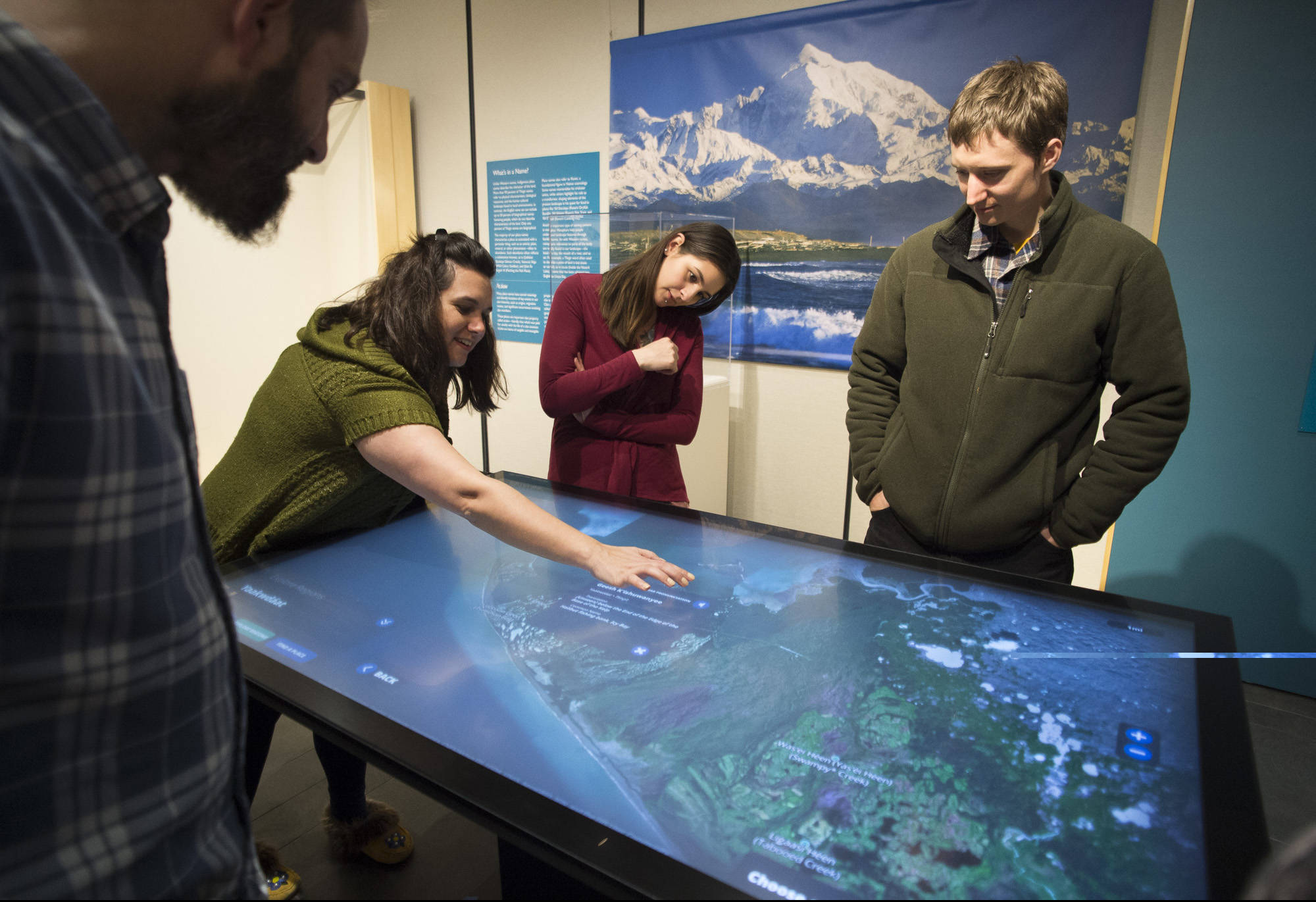Correction: An earlier version of this article didn’t include Rosita Worl’s first name when she was referenced. The article has been updated to reflect this.
On a drive from the Mendenhall Valley to downtown Juneau, one would pass the “Hand of Moldy Top” and the “Beautifully Adorned Face” before arriving at the “Trails Above Each Other.”
That’s Katlaax Jíni (Blackerby Ridge), Yadaa.at Kalé (the face of Mount Juneau) and Wooshkeenax Deiyí (on Mount Roberts), respectively.
Those and 3,500 other place names can be heard and explored at a new exhibit at the Sealaska Heritage Institute. “Our Grandparents’ Names on the Land” opens May 1 at 9 a.m. in the Nathan Jackson Gallery.
The project, a few years in the making, has taken the form of three interactive exhibits. About the size of a coffee table, the main exhibit, “Native Voices on the Land,” allows users to move around a touch-screen map of Southeast Alaska, exploring Tlingit, Tsimshian and Haida culture and history through the lens of language. Two adjoining exhibits explore Tlingit halibut and salmon fishing history through wall-mounted interactive screens.
“One of the main points we’re trying to develop here, in addition to the place names and all the information in the place names, is the cultural information that comes both from the place name itself and the environment. It’s related to clan history, clan traditions,” said Charles Smythe, project manager and the director of SHI’s culture and history department.
SHI staff tested the exhibit out on Thursday during the final stages of construction. Users are invited to explore Southeast Alaska, learning as they click on different cities, villages, fish camps and cultural sites. All the entries have a translation and the common name. Most have audio files of the correct pronunciation attached, much of it recorded by Tlingit elders.
As Native elders, many of them the last fluent speakers in their families, pass away, fear for language loss has been felt acutely in Alaska. Most of the state’s 20 officially recognized Native languages are critically endangered, according to the UNESCO Scale of Language Endangerment cited in a 2018 report from the Alaska Native Language Preservation & Advisory Council.
“Indigenous people have lived in Southeast Alaska for more than 10,000 years, and during that time, our people invented ingenious tools to catch salmon and halibut and to sustain fish populations. Our people also documented important places, including subsistence areas, through names,” SHI President Rosita Worl, Ph.D., said. “Our goal i
s to share this knowledge with the public and to honor the ingenuity of our ancestors.”
Researcher Will Geiger, a Tlingit language learner himself, spent many hours digitizing audio tapes, synthesizing information and doing data entry. He’s part of the four-person team at SHI’s culture and history department, headed by Smythe, which manages SHI’s archives and exhibits.
Staunching language loss is one goal of the project, but as a researcher, Geiger said he prefers to think of SHI’s language work as a cultural opportunity, not a rescue mission.
“A lot of times, Native cultures are seen as precarious, on the edge, about to disappear, and it’s almost like this salvage endeavor to save disappearing cultures. I like to think about it less like saving this thing that’s dying and more in positive terms. There’s just so much information and beauty here, we should be enriched by it,” Geiger said.
The database underlying “Native Voices on the Land” is a living thing, Smythe said, which they’ll continue to update and flesh out. He hopes to add audio recordings of traditional songs and photographs, in addition to beefing up the database with more place names.
Aside from the linguistic information, preserving Native place names helps social scientists like Smythe, a Ph.D’d cultural anthropologist, develop a clearer picture of Native culture and history.
“That kind of linguistic information, the fact that we have these tapes, is incredible. But also, environmental information relating to the name. We’re going to have some searches where you can look at all the sites relating to Raven, all the sites that relate to halibut,” Smythe said.
The “Salmon People” exhibit explores the innovative fish traps and lures Alaska Natives built to trap salmon sustainably. “Halibut, Attack the Hook!,” the third part of the “Our Grandparents’ Names on the Land,” takes a look at the remarkable halibut hooks, which are seeing a revival in use, invented by Southeast Alaska Native people.
All three will be available in the Nathan Jackson Gallery at SHI during business hours. The community is invited to explore “Our Grandparents’ Names on the Land” free of charge during First Friday, scheduled 4:30-7 p.m., May 4.
Researchers are invited to access the database by contacting SHI. Smythe said they’re distributing database access to Southeast schools, as well, Smythe said.
“Education is really behind this.”
• Contact reporter Kevin Gullufsen at 523-2228 and kgullufsen@juneauempire.com. Follow him on Twitter at @KevinGullufsen.

